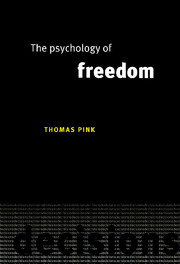Book contents
- Frontmatter
- Contents
- Acknowledgments
- Introduction
- 1 Agency and the will
- 2 Scepticism about second-order agency
- 3 Decision-making and freedom
- 4 The Psychologising conception of freedom
- 5 Decision rationality and action rationality
- 6 Decision-making and Teleology
- 7 The Regress argument
- 8 In defence of the Action model
- 9 The special-purpose agency of the will
- Conclusion
- Bibliography
- Index
5 - Decision rationality and action rationality
Published online by Cambridge University Press: 31 August 2009
- Frontmatter
- Contents
- Acknowledgments
- Introduction
- 1 Agency and the will
- 2 Scepticism about second-order agency
- 3 Decision-making and freedom
- 4 The Psychologising conception of freedom
- 5 Decision rationality and action rationality
- 6 Decision-making and Teleology
- 7 The Regress argument
- 8 In defence of the Action model
- 9 The special-purpose agency of the will
- Conclusion
- Bibliography
- Index
Summary
DECISION-MAKING AND RATIONALITY
I have claimed that our Psychologising conception of our freedom is linked to a particular theory of the will – to a conception of decision-making as a special kind of agency which is reason-applying in its effects on action:
– the will gives us control over our future action – so to take a particular decision to act is itself deliberately to perform an action.
– but the will is also a reason-applying or executive faculty: its function is to apply reason as it concerns our subsequent action – thanks to the motivation-perpetuating influence of the will, rational decisions to act leave us disposed to act rationally thereafter.
But is this psychology of the will a coherent one? There is a case for supposing that it is not. The claim that decision-making has an executive function – that a decision's function is to apply reason as it concerns subsequent action – may not after all be consistent with the claim that a decision to act is an action itself. For each of these two claims seems to imply a quite different theory of decision rationality.
In chapter 2 I suggested that we explain agency in terms of the hypothesis that it is governed by reason in a distinctively practical way. There is a distinctively practical reason. I also suggested that reason in its distinctively practical form is means–end justifiability. Agency is justified in terms of the likelihood of its furthering desirable ends – the Means–End theory of agency and agency rationality is true. So if decisions to act are actions themselves, this general theory of agency implies that those decisions are themselves means–end justifiable occurrences.
- Type
- Chapter
- Information
- The Psychology of Freedom , pp. 137 - 165Publisher: Cambridge University PressPrint publication year: 1996

